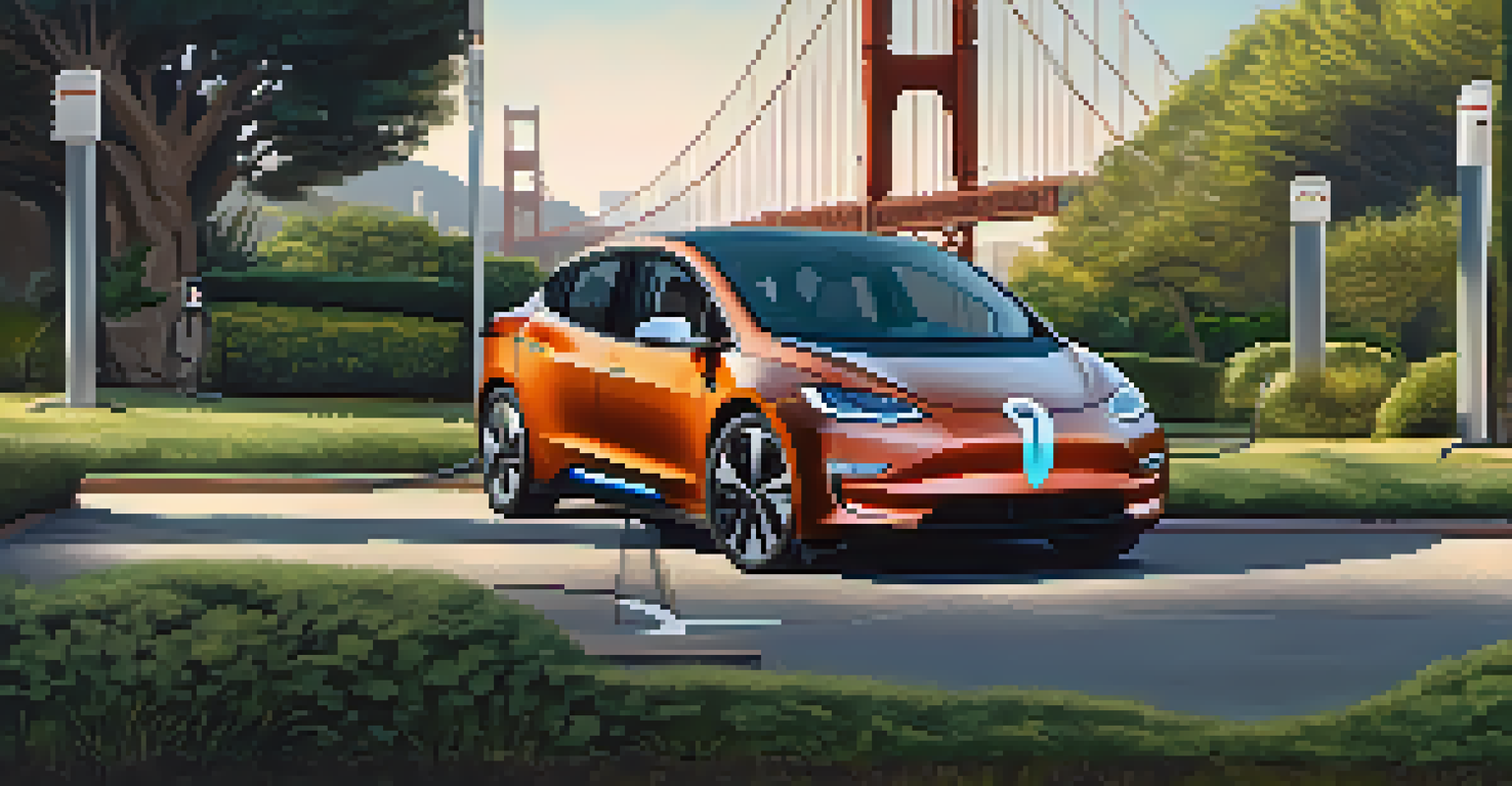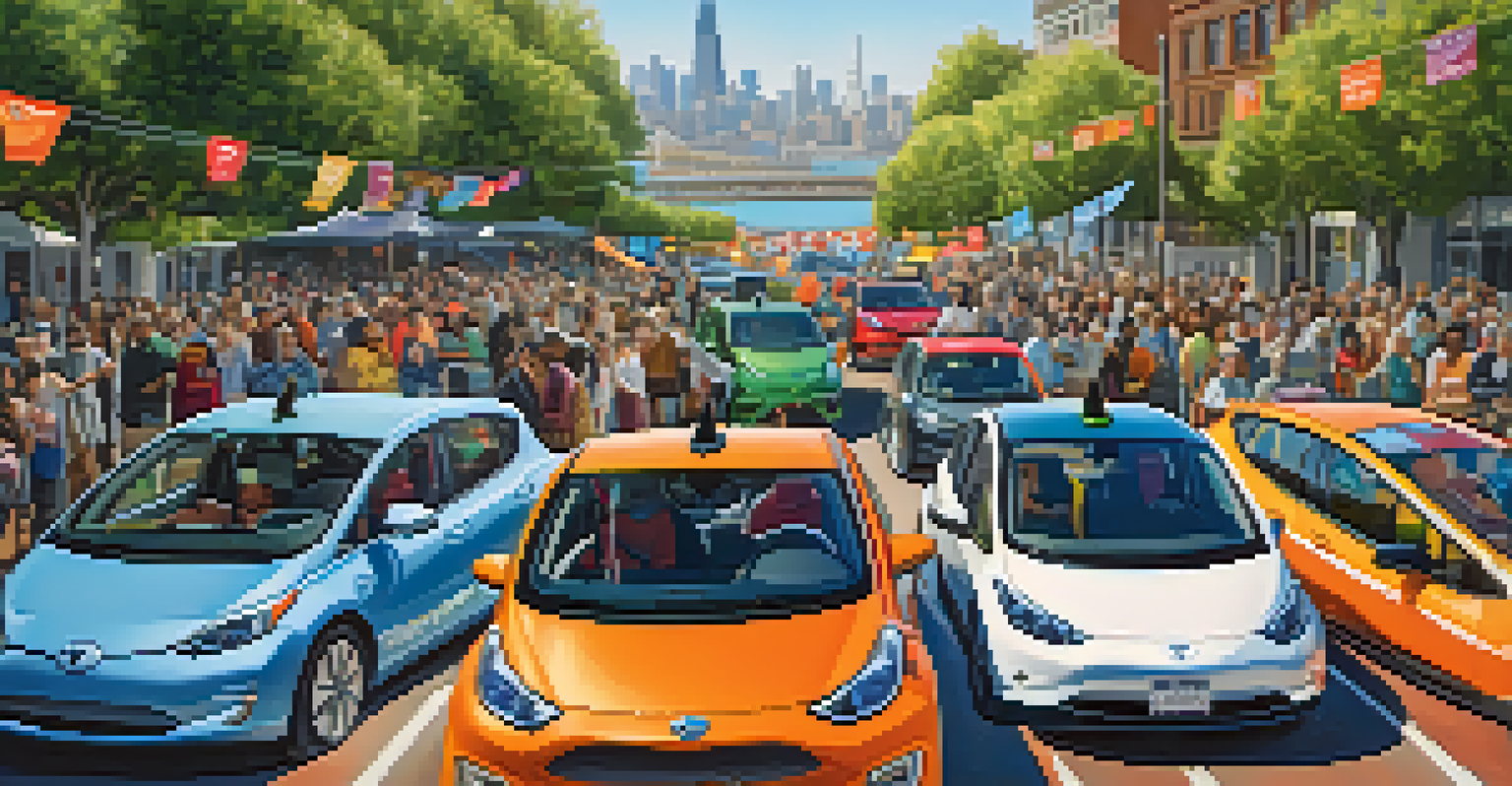The Role of Electric Vehicles in San Francisco's Clean Future

Understanding the Need for Clean Transportation
San Francisco is known for its iconic landmarks and vibrant culture, but it's also facing significant environmental challenges. As urban populations grow, the demand for cleaner transportation options becomes more pressing. Electric vehicles (EVs) present a viable solution, aiming to reduce greenhouse gas emissions and improve air quality.
The future is electric. It's time to embrace the change and make our cities cleaner and more sustainable.
The city's commitment to sustainability is evident in its ambitious goals for reducing carbon footprints. By encouraging the adoption of EVs, San Francisco is taking a proactive approach to combat climate change and promote healthier living. This aligns with the broader global movement towards greener transportation solutions.
In essence, the shift to electric vehicles is not just about adopting new technology; it's about rethinking how we move through our urban spaces. With cleaner air and quieter streets, the city envisions a more livable environment for all its residents.
The Current State of Electric Vehicles in San Francisco
As of now, San Francisco boasts a growing number of electric vehicles on its roads, reflecting a positive trend towards sustainable transport. The city has implemented various incentives to encourage residents to make the switch, including rebates, tax credits, and access to carpool lanes. These initiatives have led to a noticeable increase in EV ownership.

Additionally, the infrastructure supporting electric vehicles is expanding, with more charging stations popping up across the city. These charging points are crucial for easing range anxiety, a common concern among potential EV owners. With more convenient access to charging, residents are more likely to consider electric vehicles as a viable option.
San Francisco's EV Adoption Grows
The city is seeing a rise in electric vehicle ownership due to incentives and expanding charging infrastructure.
However, challenges remain, such as the need for further investment in charging infrastructure and addressing concerns about battery production. Nevertheless, the momentum is undeniable, and San Francisco is well on its way to becoming a leader in electric vehicle adoption.
Government Initiatives Supporting EV Adoption
The San Francisco government has taken significant steps to support the transition to electric vehicles. Programs like the EV Charging Infrastructure Plan aim to streamline the installation of charging stations throughout the city. By making it easier to charge EVs, the city is paving the way for greater adoption among residents and visitors alike.
Transportation is the linchpin of urban sustainability, and electric vehicles are key to achieving our climate goals.
In addition, the city has set ambitious targets for reducing greenhouse gas emissions from transportation. This includes a commitment to electrifying the municipal fleet and encouraging local businesses to follow suit. Such initiatives not only enhance the city’s sustainability efforts but also demonstrate leadership in the fight against climate change.
Ultimately, these government initiatives create a supportive environment for electric vehicle use. By providing the necessary resources and frameworks, San Francisco is fostering a culture that embraces clean transportation and sustainability.
The Environmental Impact of Electric Vehicles
One of the most compelling reasons to support electric vehicles is their positive environmental impact. Unlike traditional gasoline-powered cars, EVs produce zero tailpipe emissions, significantly reducing air pollution in urban areas. This is particularly important for a city like San Francisco, where air quality has been a long-standing concern.
Moreover, as the electricity grid becomes greener with renewable energy sources, the overall carbon footprint of electric vehicles continues to decrease. The shift to EVs aligns with broader efforts to transition to a sustainable energy future, where clean energy and clean transportation coexist harmoniously.
Government Supports Clean Transport
San Francisco's government initiatives aim to streamline EV infrastructure and reduce transportation emissions.
By investing in electric vehicles, San Francisco is not only improving air quality but also taking a stand for environmental justice. Clean transportation options can lead to healthier communities, particularly in neighborhoods disproportionately affected by pollution.
The Role of Private Sector in EV Growth
The private sector plays a crucial role in accelerating the growth of electric vehicles in San Francisco. Companies like Tesla have not only revolutionized the EV market but have also set the stage for others to follow. Their success has inspired startups and established automakers alike to invest in electric technology.
Additionally, businesses are starting to recognize the financial benefits of adopting electric fleets. Lower fuel and maintenance costs, combined with incentives for electric vehicles, make EVs an attractive option for companies looking to optimize their operational expenses. This shift not only benefits the businesses but also contributes to the city’s sustainability goals.
As the private sector continues to innovate and invest in electric vehicles, the momentum for EV adoption will only increase. Collaborations between businesses, government, and communities will be essential in creating a robust ecosystem that supports clean transportation.
Community Engagement and EV Awareness
Community engagement is vital in promoting electric vehicles and ensuring their successful integration into daily life. San Francisco has seen numerous initiatives aimed at raising awareness about the benefits of EVs, from educational workshops to community events. These efforts help demystify electric vehicles and encourage residents to consider making the switch.
Moreover, local organizations and advocacy groups are actively involved in promoting sustainable transportation options. By providing resources, information, and support, these groups empower residents to make informed decisions about their transportation choices. This grassroots approach is essential for fostering a culture of sustainability within the community.
Community Engagement Boosts Awareness
Local initiatives and organizations are crucial in raising awareness and fostering a culture of sustainability around electric vehicles.
Ultimately, the more residents understand the benefits of electric vehicles, the more likely they are to embrace them. Community engagement not only boosts awareness but also builds a sense of collective responsibility towards a cleaner future.
Challenges Ahead for Electric Vehicle Adoption
While the future of electric vehicles in San Francisco looks bright, challenges still lie ahead. One of the main concerns is the availability of charging infrastructure, especially in densely populated areas. As the number of EVs increases, ensuring that charging stations are accessible and convenient will be critical for continued adoption.
Additionally, the issue of battery production and disposal poses environmental concerns that need to be addressed. The production process can be resource-intensive, and finding sustainable solutions for battery recycling is vital for the long-term success of electric vehicles. Balancing growth with environmental responsibility is a challenge that must be met head-on.

Despite these obstacles, ongoing innovation and collaboration among stakeholders can help overcome these challenges. By working together, San Francisco can continue to lead the way in electric vehicle adoption and create a cleaner, more sustainable future.